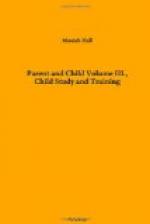7. What common-sense training should every child be given during this period?
Good books, for further study on these points, are: “The Care and Training of the Child,” by Kerr, and “Fundamentals of Child Study,” by Kirkpatrick.
If these volumes are in the library or otherwise available, it may be well to have some member read and give a brief report on one or the other of them.
THE NEEDS OF THE INFANT
The Infant’s First Needs Are Physical, and May Be Summed up in the Word Nutrition
The new-born child differs in nearly all particulars from the adult. It is very unfortunate that the child in the past has been regarded as a miniature adult and treated like “a little man.”
The structure of muscle and bone and the proportion of various parts of the body differ materially; the bones of the child for some time are soft and largely composed of cartilages which may be easily bent out of shape and permanently injured. The ratio of some of the parts is about as follows:
* * * * *
Height of head of adult to that of infant—2
to 1
Length of body of adult to that of infant—3
to 1
Length of arm of adult to that of infant—4
to 1
Length of leg of adult to that of infant—5
to 1
Besides these easily observed differences, there are others of far more consequence not easily seen, such as differences in the size, structure and activity of vital organs, and in the almost total lack of nervous development in the child as compared with the adult. All of these things make of the child an individual so different from the adult that he must be treated in accordance with his own nature and needs and with little regard to the way in which an adult is considered.
Practically everything that the infant needs may be summed up in the one word nutrition. A sufficient supply of pure milk from the mother is the one supreme requirement. If this is assured, everything else is almost certain to follow. Of course, the little one must be kept at the right temperature, which is comparatively high during the first few months. An abundance of pure, fresh air also must be supplied to both mother and child. It is wise for both to spend much time in the open air and to sleep on a screened porch.
The child should be kept quiet and permitted to sleep as long as nature dictates. It is a positive sin to snatch the child from its bed, toss it up and down and screech at it for the edification of curious visitors. Kissing the child in the mouth should also be positively prohibited. The use of patent medicines likewise, or even many of the “old mother remedies” should never be indulged except on the advice of a competent physician. The needs of the child for some time are strictly physical. Inner forces are at work which cannot be assisted except indirectly through care of the physical organism. So far as nervous or mental development is concerned the rule should be, “Hands off, let Nature take her course.”




